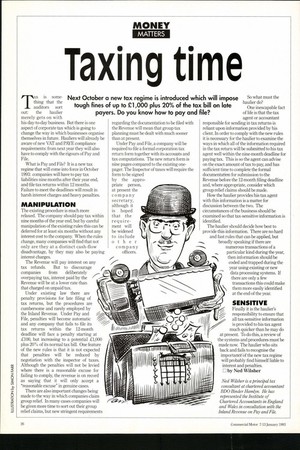Taxing time Next October a new tax regime is introduced
Page 28

If you've noticed an error in this article please click here to report it so we can fix it.
which will impose tough fines of up to £11,000 plus 20% of the tax bill on late payers. Do you know how to pay and file? Tax is something that the auditors sort out: the haulier merely gets on with his day-to-day business. But there is one aspect of corporate tax which is going to change the way in Which businesses organise themselves in future. Hauliers will already be aware of new VAT and PAYE compliance requirements: from next year they will also have to comply with the rigours of Pay and File.
What is Pay and File? It is a new tax regime that will come into force in October 1993: companies will have to pay tax liabilities nine months after their year end, and file tax returns within 12 months. Failure to meet the deadlines will result in harsh interest charges and heavy penalties.
MANIPULATION The existing procedure is much more relaxed. The company should pay tax within nine months of the year end, but by careful manipulation of the existing rules this can be deferred for at least six months without any interest cost to the company. When the rules change, many companies will find that not only are they at a distinct cash-flow disadvantage, by they may also be paying interest charges.
The Revenue will pay interest on any tax refunds. But to discourage ( companies from deliberately overpaying tax, interest paid by the 7r--Revenue will be at a lower rate than that charged on unpaid tax.
Under existing law there are penalty provisions for late filing of tax returns, but the procedures are cumbersome and rarely employed by the Inland Revenue. Under Pay and File, penalties will become automatic and any company that fails to file its tax returns within the 12-month deadline will face a penalty starting at £100, but increasing to a potential £1,000 plus 20% of its normal tax bill. One feature of the new rules is that it is not expected that penalties will be reduced by negotiation with the inspector of taxes. Although the penalties will not be levied where there is a reasonable excuse for failing to comply, the revenue is on record as saying that it will only accept a "reasonable excuse" in genuine cases.
There are also important changes being made to the way in which companies claim group relief. In many cases companies will be given more time to sort out their group relief claims, but new stringent requirements regarding the documentation to be filed with the Revenue will mean that group tax planning must be dealt with much sooner than at present.
company officers. So what must the haulier do?
One inescapable fact of life is that the tax agent or accountant responsible for sending in tax returns is reliant upon information provided by his client. In order to comply with the new rules it is necessary for the haulier to examine the ways in which all of the information required in the tax return will be submitted to his tax agent well within the nine-month deadline for paying tax. This is so the agent can advise on the exact amount of tax to pay, and has sufficient time to complete the formal documentation for submission to the Revenue before the 12-month filing deadline and, where appropriate, consider which group relief claims should bentade.
How the haulier provides his tax agent with this information is a matter for discussion between the two. The circumstances of the business should be examined so that tax-sensitive information is identified.
SENSITIVE Finally it is the haulier's responsibility to ensure that all tax-sensitive information is provided to his tax agent much quicker than he may do at present. To do this, a review of the systems and procedures must be made now. The haulier who sits back and fails to recognise the importarktof the new tax regime will probably find himself liable to interest and penalties.
CI by Ned Wilsher Ned Wilsher is a principal tax consultant at chartered accountant BDO Binder Hamlyn. He has represented the Institute of Chartered Accountants in England and Wales in consultation with the Inland Revenue on Pay and Fik.




























































